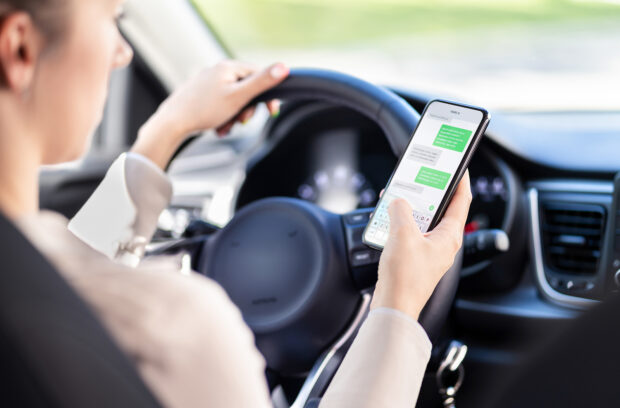Passengers can dramatically reduce texting while driving by asking the driver to stop, according to a new survey commissioned by Erie Insurance.
Nearly half of drivers who were asked or told to stop texting (43 percent) said they stopped doing it immediately and never did it again.
Yet 10 percent of passengers don’t speak up when a driver starts texting because they wouldn’t want to offend the driver or feel uncomfortable doing so.
Erie Insurance reached out to a psychology professor for tips for how passengers can overcome their discomfort when asking drivers to stop texting while driving.
Dr. Stanislaw Kolek, a visiting assistant professor at Allegheny College, whose areas of study include vulnerable road users, driver training, driving styles and hazard perception in driving offers four different approaches for asking a driver to stop texting while driving.
Negotiation involves acknowledging the situation and providing a solution.
“If you are in a car and the driver starts texting, you could say, ‘It looks like you really need to be texting someone right now, so why don’t you let me drive? I can drive and you can text, and once we get to our destination, you can get back into the driver’s seat,'” said Kolek. “It’s a way to get them to realize that the behavior is not wanted and that you’ve already come up with a solution. Asking them if you can be the driver in that situation is usually a very non-antagonistic way of getting yourself out of a dangerous situation.”
Another tactic involves positive reinforcement to let the driver know how putting down their phone can benefit them.
For example, some auto insurers offer a smartphone app that rewards safe drivers with points that can be used for gift cards or donated to charity. Erie Insurance reports drivers using its YourTurn app have seen an average reduction of 35 percent in phone distractions, 20 percent in hard braking and 20 percent reduction in at-risk speeding.
“Letting the driver know about a rewards program is a good approach, especially if they don’t already know about it. You can say ‘Hey, there is this app you can download and be rewarded if you just don’t use your phone while driving,'” said Kolek.
Partnership and mutual accountability is like a buddy system in which two people both agree to do or not do something and hold each other accountable.
“You can say, ‘If I don’t text while driving, you can also not do it, and then we can both kind of keep each other accountable,'” said Kolek.
Creating negative consequences for the driver is another tactic.
One negative consequence, Kolek says, is social isolation with a group. “You can say, ‘You’re the driver and I am your passenger and we’re a team right now. I really don’t want to be in the car with you while you are texting.’ That would probably be effective if the person is reasonable and wants you to continue riding with them,” said Kolek.
The data is from a survey Erie Insurance commissioned to explore the notion that for society at large to stop a negative behavior, it has to become socially unacceptable.
The survey asked people not for their personal opinions but rather how they think society as a whole views texting while driving.
Almost three-quarters (73 percent) think texting while driving is socially unacceptable, leaving 27 percent who think it’s considered socially acceptable, an indication that more progress needs to be made in terms of changing society’s views on the topic, the insurer said.





















 Experts Say It’s Difficult to Tie AI to Layoffs
Experts Say It’s Difficult to Tie AI to Layoffs  Chubb CEO Greenberg on Personal Insurance Affordability and Data Centers
Chubb CEO Greenberg on Personal Insurance Affordability and Data Centers  Allianz Built an AI Agent to Train Claims Professionals in Virtual Reality
Allianz Built an AI Agent to Train Claims Professionals in Virtual Reality  Preparing for an AI Native Future
Preparing for an AI Native Future 




